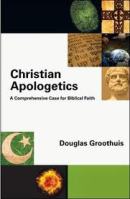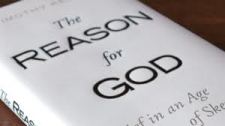The two major issues covered in this chapter of Groothuis’ Christian Apologetics are: 1) the “God or a bad man” argument for Jesus’ deity, and 2) the logical coherence of a “Godman” (someone who is both God and man).
The “God or a bad man” argument for the deity of Jesus from p. 507:
1. If Jesus claimed to be divine (in addition to being human), but was not divine, he was a bad man and merely human; that is, he was deceived, or a deceiver.
2. Jesus was not a bad man and merely human; that is, he was neither deceived, nor a deceiver.
3. Therefore, Jesus was divine (in addition to being human).
Objections:
A. The objection that it is the stuff of legend that Jesus ever claimed deity fails because 1. “the primary documents concerning Jesus were written only a few decades after his death by eyewitnesses or those who consulted them and other reliable sources” and 2) “we cannot find an original teaching of Jesus in which he is shorn of divine claims, either implicit or explicit.” (p. 509)
B. Jesus as guru. “If Jesus really meant to teach an esoteric message that differs completely from what Christianity has always taken it to mean, he was one of the worst teachers in the history of humanity, since for two thousand years he has been taken by his followers (and his critics) to teach monotheism.” (p. 510)
C. Jesus as a bad man (deceiver). This fails because claiming deity was a very bad public relations maneuver in ancient Israel, and he got nothing out of it except crucifixion. What was his motive? How does all of that mesh with the rest of what we know about him? Why choose to believe he claimed deity, but trash the rest?
D. Jesus as deceived (either mistaken, but sane, or mad as a hatter). To mistake oneself as God is no small mistake, and “Jesus’ claim to have unique authority and supremacy in and over the universe is central to his beliefs and teachings and actions.” (Matthew 7:21-29; 11:28-30) (p. 513) How could he be such a master teacher about everything except his own deity? How could he be such a genius in the area of Ethics (see “greatest commandment” passages showing works flow from faith), and Matthew 7:24-29, 11:27, John 14:1-6, Acts 4:12), but be so deceived about his own identity? Although some claimed Jesus was insane or possessed, they did not persist in that belief (James, Jesus brother, converted to Christianity after his resurrection), or they only made such claims because they opposed his teaching. The fact that the Gospel authors do not shy away from mentioning this embarrassing detail is a testament to their confidence that he was who he claimed to be.
The statement of the Council of Chalcedon affirms the true humanity and true deity of Jesus in one person.
Hypostatic union is the relationship of Jesus’ divine and human natures as being “one person with two natures”.
Kierkegaard was wrong… (but right about a lot of other things)…
Contradiction vs. paradox. A contradiction involves 2 necessarily incompatible (irresolvable) properties, whereas a paradox appears contradictory, but there may be a resolution.
Contradiction: Jesus possesses ONLY divine attributes and ONLY human attributes. (That’s not the incarnation.)
Paradox: Jesus possesses BOTH divine attributes AND human attributes. (That’s not contradictory.)
Just vs. fully. We are “just” human (and nothing more), but Jesus is “fully” human (plus divine).
Common vs. essential. Some properties are common to humans (being earth born), that are not essential for being a human (a human could be born in a space ship that has left earth’s atmosphere). That Jesus does not possess those common properties (like “only possessing human properties” or “not having divine properties”) does not negate his humanity, as he does possess the essential properties of being human.
The Chalcedonian formulation is biblically orthodox and logically possible, therefore the incarnation is not logically incoherent.
The “God or a bad man” argument in my own words:
1. If Jesus wasn’t God, his claims to be God came from his own merely-human self-deception, or an evil motive to deceive.
2. There is too much evidence in favor of Jesus’ genius, confidence, self-composure, and perfect goodness.
3. Therefore he is neither deceived, nor a deceiver–he is God.










